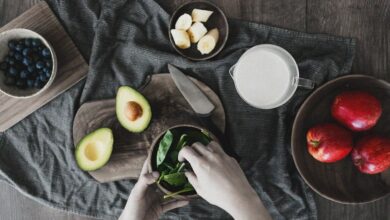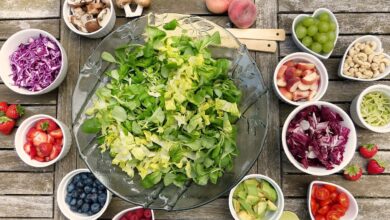What Should I Be Eating Everyday to Be Healthy: Essential Guide

Eat a balanced diet with fruits, vegetables, whole grains, lean proteins, and healthy fats every day. Avoid processed foods and sugary drinks for optimal health.
Maintaining a healthy diet is crucial for overall well-being. Consuming a variety of nutrient-dense foods ensures your body gets essential vitamins and minerals. Incorporate colorful fruits and vegetables for antioxidants and fiber. Whole grains provide sustained energy and support digestion.
Lean proteins, such as chicken, fish, and legumes, help build and repair tissues. Healthy fats from sources like avocados, nuts, and olive oil promote heart health. Staying hydrated with water and limiting processed foods and sugary drinks can help reduce the risk of chronic diseases. Making mindful food choices daily can lead to a healthier, more vibrant life.
Balanced Diet Basics
Eating a balanced diet ensures your body gets the nutrients it needs. It helps maintain your energy levels and supports overall health. A balanced diet includes a mix of macronutrients and micronutrients.
Macronutrients Overview
Macronutrients are nutrients your body needs in large amounts. They include carbohydrates, proteins, and fats. Each plays a key role in your health.
- Carbohydrates: These are your body’s main energy source. Choose whole grains, fruits, and vegetables.
- Proteins: Proteins help build and repair tissues. Good sources include lean meats, beans, and nuts.
- Fats: Fats provide energy and support cell function. Opt for healthy fats like those from avocados, nuts, and olive oil.
Micronutrients Importance
Micronutrients are vitamins and minerals needed in smaller amounts. They are vital for preventing diseases and ensuring proper growth.
| Micronutrient | Function | Sources |
|---|---|---|
| Vitamin A | Supports vision and immune function | Carrots, sweet potatoes, spinach |
| Vitamin C | Boosts immune system | Citrus fruits, strawberries, bell peppers |
| Calcium | Strengthens bones and teeth | Dairy products, leafy greens, almonds |
| Iron | Improves blood health | Red meat, beans, lentils |
Incorporate a variety of these nutrients in your daily diet. This ensures you meet your body’s needs for both macronutrients and micronutrients.
Fruits And Vegetables
Fruits and vegetables are essential for a healthy diet. They provide vital nutrients, fiber, and antioxidants. Eating a variety of fruits and vegetables every day can improve your health.
Daily Servings
How many servings of fruits and vegetables should you eat daily? Aim for at least 5 servings of fruits and vegetables each day. This can be broken down into:
- 2-3 servings of fruits
- 2-3 servings of vegetables
Nutrient-rich Choices
Choosing the right fruits and vegetables is important. Opt for nutrient-rich choices to maximize health benefits. Here are some examples:
| Fruits | Vegetables |
|---|---|
| Berries (blueberries, strawberries) | Leafy greens (spinach, kale) |
| Citrus fruits (oranges, grapefruits) | Cruciferous veggies (broccoli, cauliflower) |
| Apples | Bell peppers |
| Bananas | Carrots |
Incorporate these options into your diet for a nutrient boost. Remember, variety is key. Include different colors and types to cover all nutrient bases.
Whole Grains
Whole grains are essential for a balanced diet. They provide important nutrients like fiber, vitamins, and minerals. Consuming whole grains daily can improve your overall health.
Benefits Of Whole Grains
Whole grains offer a wide range of benefits:
- High in Fiber: Helps in digestion and prevents constipation.
- Rich in Vitamins: Provide essential B vitamins for energy.
- Mineral-Rich: Supply iron, magnesium, and zinc.
- Heart Health: Reduce the risk of heart disease.
- Weight Management: Help in maintaining a healthy weight.
Incorporating Into Meals
It’s easy to add whole grains to your daily meals:
| Meal | Whole Grain Options |
|---|---|
| Breakfast |
|
| Lunch |
|
| Dinner |
|
| Snacks |
|
Start by replacing refined grains with whole grains. Choose whole grain bread instead of white bread. Opt for brown rice instead of white rice. These small changes make a big difference.
Proteins
Proteins are the building blocks of our bodies. They help build muscles, repair tissues, and produce enzymes and hormones. Eating enough protein every day is essential for a healthy diet. Let’s explore some sources of protein you can include in your daily meals.
Animal-based Sources
Animal-based proteins provide all essential amino acids your body needs. These sources are highly bioavailable, meaning your body can easily absorb and use them.
- Chicken: A lean protein source, rich in vitamins and minerals.
- Fish: Packed with omega-3 fatty acids, great for heart health.
- Eggs: Offer high-quality protein and essential nutrients.
- Beef: Rich in iron and vitamin B12.
- Dairy: Milk, cheese, and yogurt provide calcium and protein.
Plant-based Alternatives
Plant-based proteins are excellent for those who prefer a vegetarian or vegan diet. They are also rich in fiber, vitamins, and minerals.
- Legumes: Beans, lentils, and chickpeas are high in protein and fiber.
- Nuts and Seeds: Almonds, chia seeds, and flaxseeds offer healthy fats and protein.
- Tofu and Tempeh: Soy-based products that are versatile and protein-rich.
- Quinoa: A complete protein that contains all nine essential amino acids.
- Seitan: Made from gluten, it’s a high-protein meat substitute.
Incorporating both animal-based and plant-based proteins can offer a balanced diet. Here’s a simple comparison of some protein sources:
| Source | Protein Content (per 100g) |
|---|---|
| Chicken Breast | 31g |
| Salmon | 20g |
| Eggs | 13g |
| Lentils | 9g |
| Almonds | 21g |
| Tofu | 8g |
Healthy Fats
Healthy fats are essential for overall wellness. They help absorb vitamins, support brain function, and reduce inflammation. Incorporating healthy fats into your daily diet can improve heart health and boost energy levels.
Types Of Healthy Fats
There are various types of healthy fats that benefit your body:
- Monounsaturated fats: These fats are known to lower bad cholesterol levels.
- Polyunsaturated fats: These include omega-3 and omega-6 fatty acids, which are essential for brain function.
- Omega-3 fatty acids: These fats reduce inflammation and support heart health.
Sources Of Healthy Fats
Incorporating these sources into your diet ensures you get the right fats:
- Avocados: Rich in monounsaturated fats, avocados are heart-healthy.
- Nuts and seeds: Almonds, walnuts, and flaxseeds are excellent sources of healthy fats.
- Olive oil: Extra virgin olive oil is perfect for cooking and salad dressings.
- Fatty fish: Salmon, mackerel, and sardines are packed with omega-3 fatty acids.
- Chia seeds: These tiny seeds offer a good dose of omega-3s.
| Food | Type of Fat | Health Benefit |
|---|---|---|
| Avocado | Monounsaturated | Reduces bad cholesterol |
| Salmon | Omega-3 | Supports heart health |
| Almonds | Monounsaturated | Improves brain function |
| Olive Oil | Monounsaturated | Anti-inflammatory |
| Chia Seeds | Omega-3 | Boosts energy levels |

Credit: www.facebook.com
Hydration
Staying hydrated is essential for maintaining good health. Your body needs water to function properly. Hydration affects energy levels, brain function, and overall well-being. Drinking enough water is crucial, but you can also get fluids from other sources.
Importance Of Water
Water is vital for every cell in your body. It helps regulate body temperature, keeps joints lubricated, and aids digestion. Drinking enough water can also prevent dehydration, which can cause headaches and fatigue.
Benefits of Drinking Water:
- Keeps skin healthy
- Aids in weight loss
- Flushes out toxins
- Improves mood and concentration
Experts recommend drinking eight 8-ounce glasses of water daily. This is also known as the 8×8 rule. Everyone’s needs vary, so listen to your body and drink when thirsty.
Hydrating Foods
Besides water, many foods are excellent sources of hydration. These foods can help you stay hydrated throughout the day.
| Food | Water Content |
|---|---|
| Cucumber | 95% |
| Watermelon | 92% |
| Strawberries | 91% |
| Lettuce | 96% |
These hydrating foods are not only refreshing but also nutritious. Add them to your meals and snacks to boost your hydration levels.
Other Hydrating Foods:
- Oranges
- Pineapples
- Spinach
- Tomatoes
Including these foods in your diet can help meet your hydration needs. Drinking water and eating hydrating foods work together to keep you healthy and energized.
Meal Planning
Planning meals helps you stay on track with your health goals. It ensures you get the right nutrients daily. A good meal plan includes a variety of foods. This helps you avoid boredom and ensures a balanced diet.
Creating Balanced Meals
Balanced meals include foods from all food groups. This ensures you get the necessary nutrients. Here are some tips to create balanced meals:
- Proteins: Include lean meats, fish, beans, or nuts.
- Vegetables: Aim for a variety of colors and types.
- Fruits: Choose fresh, frozen, or canned fruits.
- Grains: Opt for whole grains like brown rice or quinoa.
- Dairy: Select low-fat or fat-free options.
Using this guide helps you create meals that are both nutritious and delicious.
Portion Control Tips
Portion control is key to maintaining a healthy weight. Here are some simple tips to help you manage portions:
- Use smaller plates to help control portions.
- Fill half your plate with vegetables or salads.
- Measure portions of grains and proteins.
- Be mindful of serving sizes on food labels.
- Drink water before meals to feel fuller.
These tips make it easier to avoid overeating and stay healthy.

Credit: smellthemintleaves.com
Avoiding Processed Foods
Processed foods are convenient but often unhealthy. They contain added sugars, unhealthy fats, and artificial ingredients. Avoiding processed foods can improve your health and energy levels. Let’s explore what processed foods are and what healthy alternatives you can enjoy.
Understanding Processed Foods
Processed foods are foods that have been altered from their natural state. This includes adding preservatives, flavors, or other additives. They are usually high in calories and low in nutrients.
Examples of processed foods include:
- Frozen meals
- Chips and snacks
- Sugary cereals
- Soda and sugary drinks
- Packaged baked goods
Eating too many processed foods can lead to health problems. These include obesity, diabetes, and heart disease. Understanding what processed foods are can help you make better choices.
Healthy Alternatives
Choosing whole, natural foods is key to a healthy diet. Here are some healthy alternatives to common processed foods:
| Processed Food | Healthy Alternative |
|---|---|
| Frozen meals | Fresh vegetables and lean proteins |
| Chips and snacks | Fresh fruits and nuts |
| Sugary cereals | Oatmeal with fresh berries |
| Soda and sugary drinks | Water with lemon or herbal teas |
| Packaged baked goods | Homemade whole-grain muffins |
Eating whole foods can be easy and delicious. Here are some tips:
- Prepare meals at home using fresh ingredients.
- Choose whole grains like brown rice and quinoa.
- Snack on fruits, vegetables, and nuts.
- Drink water or herbal teas instead of sugary drinks.
- Read labels and avoid foods with long ingredient lists.
By choosing healthy alternatives, you can enjoy a more nutritious diet. Your body will thank you!
Supplements
Supplements can help fill nutritional gaps in your diet. They provide essential nutrients your body needs to function well. But, not everyone needs to take them. Learn when to consider supplements and how to choose the right ones.
When To Consider Supplements
Sometimes, your diet may lack certain nutrients. In such cases, supplements can help. Here are some scenarios where you might consider taking them:
- Pregnancy: Folic acid is important for a baby’s development.
- Vegan or Vegetarian Diet: Vitamin B12 is often missing.
- Age: Older adults may need more calcium and vitamin D.
- Health Conditions: Some illnesses require extra nutrients.
Choosing The Right Ones
Picking the right supplement is crucial. Not all supplements are the same. Here are some tips to help you choose wisely:
- Read Labels: Check for certifications and ingredient lists.
- Consult a Doctor: Always ask your healthcare provider first.
- Research Brands: Look for reputable brands with good reviews.
- Avoid Megadoses: Too much of a nutrient can be harmful.
Here is a quick guide to some common supplements and their benefits:
| Supplement | Benefit |
|---|---|
| Vitamin D | Supports bone health |
| Omega-3 | Improves heart health |
| Probiotics | Aids digestion |
| Multivitamins | General health support |

Credit: www.pinterest.com
Frequently Asked Questions
What Is Healthy To Eat Every Day?
Eat fruits, vegetables, whole grains, lean proteins, and healthy fats daily. Drink plenty of water. Avoid processed foods and sugary drinks.
What To Eat Daily For A Healthy Body?
Eat a balanced diet with fruits, vegetables, lean proteins, whole grains, and healthy fats. Drink plenty of water. Avoid processed foods and sugary drinks. Include nuts, seeds, and legumes for added nutrition. Aim for variety to ensure you get essential vitamins and minerals.
What Are The Healthiest Everyday Foods?
The healthiest everyday foods include leafy greens, berries, nuts, whole grains, lean proteins, and legumes. These foods provide essential nutrients, antioxidants, and fiber. Eating a balanced diet with these foods supports overall health and well-being. Prioritize fresh, unprocessed options for maximum benefits.
What Is A Good Daily Eating Routine?
A good daily eating routine includes balanced meals. Eat breakfast, lunch, and dinner at consistent times. Incorporate fruits, vegetables, lean proteins, and whole grains. Stay hydrated with water. Limit sugary snacks and processed foods.
Conclusion
Eating a balanced diet is crucial for maintaining good health. Focus on incorporating fruits, vegetables, whole grains, and lean proteins. Stay hydrated by drinking plenty of water. Avoid processed foods and sugary drinks. By making these changes, you’ll support your body and improve your overall well-being.
Start today for a healthier tomorrow.


